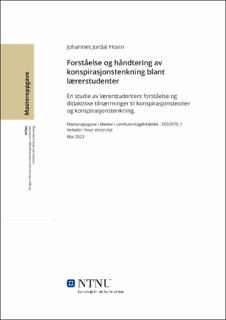| dc.contributor.advisor | Vesterdal, Knut | |
| dc.contributor.author | Hovin, Johannes Jordal | |
| dc.date.accessioned | 2023-07-12T17:22:30Z | |
| dc.date.available | 2023-07-12T17:22:30Z | |
| dc.date.issued | 2023 | |
| dc.identifier | no.ntnu:inspera:138899595:97324545 | |
| dc.identifier.uri | https://hdl.handle.net/11250/3078492 | |
| dc.description.abstract | Denne masteroppgaven har som formål å kartlegge hvordan et utvalg lærerstudenter på NTNU forstår konspirasjonsteorier og konspirasjonstenkning, og hvilke didaktiske tilnærminger de ser i møte med konspirasjonsteorier og konspirasjonstenkning i skolen. Oppgaven prøver å besvare denne problemstillingen med kvalitative semi-strukturerte dybdeintervju, og ved å spesielt belyse hvordan lærerstudentene ser tematikken i forbindelse med kritisk tenking. Sett i lys av ulike didaktiske tilnærminger fra Dyrendal (2018) ser oppgaven på hvordan lærerstudentene reflekterer over hvordan de ser for seg å jobbe med tematikken når de blir lærere. Oppgaven konkluderer med at lærerstudentene klarer å se sammenhengen mellom konspirasjonsteorier og konspirasjonstenkning og relevante læreplanmål, som kritisk tenkning, men at få av intervjudeltakerne ser for seg flere konkrete tilnærminger til hvordan de kan lage undervisningsopplegg rundt konspirasjonsteorier, eller hvordan de kan håndtere tegn til konspirasjonstenkning hos elever. | |
| dc.description.abstract | The purpose of this master's thesis is to map how a selection of student teachers at NTNU understand conspiracy theories and conspiracy thinking, and which didactic approaches they see when working with conspiracy theories and conspiracy thinking in the school. The assignment attempts to answer this issue with qualitative semi-structured in-depth interviews, and by particularly clarifying how the student teachers see the topic in the context of critical thinking. Seen in the light of different didactic approaches from Dyrendal (2018), the thesis looks at how student teachers reflect on how they see themselves working with the topic when they become teachers. The paper concludes that the student teachers are able to see the connection between conspiracy theories and conspiracy thinking and relevant curriculum goals, such as critical thinking, but that most of the interview participants do not envisage several concrete approaches to how they can create teaching plans around conspiracy theories, or how they can deal with signs of conspiracy thinking in students. | |
| dc.language | nob | |
| dc.publisher | NTNU | |
| dc.title | Forståelse og håndtering av konspirasjonstenkning blant lærerstudenter: En studie av lærerstudenters forståelse og didaktiske tilnærminger til konspirasjonsteorier og konspirasjonstenkning. | |
| dc.type | Master thesis | |
